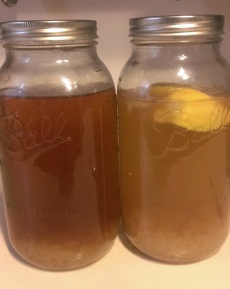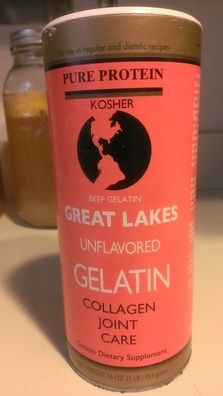12 Comments
'What? What is she talking about? Pregnant women should never ever drink alcohol!' (I might be exaggerating a bit there). No, I'm not talking about alcohol. Who is going to get that into a hospital? I'm talking about water. 'Water?! Oh, water is great. Did you know that if you feel thirsty, you're already dehydrated, and pregnant women ESPECIALLY need to be drinking at least 100 ounces of water a day! And labor is just like a marathon, so keep your water and laboraid close and make sure that you're getting plenty of fluids!!' Here's the thing though. EVERYTHING in life is about moderation. For some reason, this doesn't seem to apply to water. As I've written about before, this is likely due to misinformation and exaggeration, first on the part of bottled water companies, and then picked up and disseminated by the health industry. Statements like "drink 8, 8 ounce glasses of water a day", or, "drink one half of your body weight in ounces of water a day" may seem harmless even if they aren't based on science, but are they? Can this type of advice be particularly dangerous for pregnant and laboring women? Yes, there is evidence that it can be. Our cells require a certain balance of nutrients and salts. What happens in hyponatraemia (overhydration/low sodium levels) is that the extracellular fluid becomes too diluted with water and rushes into the body's cells, which causes them to swell and triggers the sympathetic nervous system, or a stress response. That is of course a very simple version; the actual mechanism is way more complicated and also involves the interplay of potassium, calcium, and other minerals in the cells and cell membranes. However along with the stress response comes many symptoms which probably many of us who have taken the mainstream advice on water consumption have experienced: ….sound familiar? Yeah, I thought so. Yet many pregnant women who complain of any of these symptoms during pregnancy will be told…what? "You're probably dehydrated, drink MORE WATER". So it's a dangerous cycle. The authors of the study below note that "The maximum capacity of excreting a water load at rest is reported to be approximately 900 ml per hour in healthy women but is reduced by one-third in late pregnancy". So pregnant women are not able to get rid of extra fluid as quickly as a non-pregnant woman, which makes overhydration even more likely. They also note that "no physiologic warning system protects the body against overhydration". (See opening quote for a slightly different perspective on that). This means that once a person starts to become overhydrated, they can no longer trust what their body is telling them, because excessive thirst may not mean that the body needs fluid, but rather, salt. So avoiding that state is important! Instead, here is what I tell pregnant women (and everyone, really). Drink when you're thirsty, and not a lot more than that. Animals and children know how to do this. Why do we, as adults, think that someone else has to tell us how much to drink to be sufficiently hydrated? And you don't even have to only drink water. There are many nutritious, tasty beverages that contain lots of water, but also minerals, salts, natural sugars, and probiotics. Some that you might consider are grass-fed whole milk, kombucha, water kefir, herbals teas, and even broth (homemade!). Why This is Especially Important for the Laboring Mother It's only been recently that hospitals have been "allowing" women to eat and drink during labor. Of course this is a basic human right, and a long time coming. However, it can also be a risk, because there are many women (especially those that are health conscious, who may already starting out labor slightly overhydrated) who have been told that labor is like a marathon, and that staying hydrated is vital to a healthy labor and baby. While part of this is true, and hydration is important, the truth is that labor is NOT like a marathon. Or rather, women's bodies in labor are not acting at all like the body of a marathon runner, or even someone exercising. A simple, crucial fact is missing. Oxytocin, the "hormone of labor, love hormone", encourages the body to RETAIN water. So a woman that is drinking constantly throughout labor, especially a longer labor, may be in danger of drinking herself and her baby right into hyponatraemia. How can I say that? Not only have I heard of several instances from doulas where a client had a difficult, long labor and ended up with a cesarian birth, but there was enough awareness of it in the medical community to do several studies on it. The most recent is quite compelling. In, Hyponatremia Complicating Labor: Uncommon or Unrecognized? The authors note that a high total fluid volume (2500 mL or approximately 85 ounces, by mouth and intravenously) taken in by a laboring woman was significantly correlated with overhydration, a longer second stage of labor, and other complications during the birth. Honestly you should really read the whole paper; it's not too long and really fascinating. But here are some key points: Who are most at risk? feel free to pin this or save for later! feel free to pin this or save for later! A woman who desires a natural birth and who is giving birth at home or a birth center should be encouraged to drink if she feels like it. Since the body retains more fluid during labor, she likely will need less fluids than normal. If she voluntarily is drinking more than 8 ounces of fluid an hour over the course of several hours, this could be worrisome and she might be encouraged to back off on the fluids. It's been noted before that the symptoms of overhydration often mimic dehydration, so keeping track of fluid intake can be very important. I did some research on how much fluid a woman laboring in the hospital might be given if she requires an induction, antibiotics for Group B Strep, or an epidural. It's likely that if an IV of fluids is hooked up, the laboring mother will receive at least 1000 mL total, at 125 mL per hour (4.2 ounces) or sometimes even 250 mL (8.45 ounces) per hour. These women are likely most at risk, especially if they are also taking in oral fluids. Women who are continuously receiving IV fluids should be very careful with how much they add to that by drinking, and birth partners and doulas probably shouldn't be encouraging the mother to drink extra fluids. Remember, 26% of women who received more than 2500 mL (about 84 ounces), developed hyponatraemia, so it wasn't a rare occurrence by any means. What is the Bottom Line?Basically, all humans have the ability to tell when they're thirsty and when they need to drink. Sometimes we get so used to people telling us what to do, that we forget how to listen to our bodies, but pregnancy is a wonderful time to start really tuning in and trusting your body and instincts. Despite the common advice to drink at least 64 ounces of water a day, and even more during pregnancy, there is no scientific proof to back this up. Each person is different and has varied fluid intake needs. During labor, a woman should be able to drink when she's thirsty, and not encouraged to keep hydrating unless there is clear indication of dehydration. However, thirst can't always be trusted as a sign of this, since excessive thirst is also a sign of being overhydrated. If a mother is receiving IV fluids AND oral hydration, especially over the course of a long labor, the care providers (or family and friends) should be especially careful to make a note of the total fluid volume, since these women are most at risk of overhydration. To Be Continued....Implications for BabyWhat do you think? Is overhydration more common or less common than the evidence suggests?
My Mom used to tell me about how she craved jello when she was pregnant with my sister and I (twins). In fact, she craved it so much that she would wait until my Dad went to work, then make a package the "quick-set" way, and then eat the whole thing herself. I could tell that this seemed really strange to her...almost like she was guilty about it! But the more I started learning about the nutritional needs of pregnant women, the more I understood how WISE her body was! Building babies takes a LOT of nutrients, including proteins and fats (she was building two!) Personally, I craved eggs during my first pregnancy, which isn't surprising now considering that I ate a mostly vegetarian diet. My body knew that I needed more protein than I was getting, and it told me so. Now that I know more about how helpful probiotics are for a healthy immune system and pregnancy, I'm sharing a recipe that has quality protein and probiotics in a tasty package. Water Kefir Jello my water kefir my water kefir I've made this one with apple cinnamon flavored water kefir, but you can use any flavor. Water kefir is a mild, broad-spectrum probiotic beverage that can be flavored in myriads of ways. Probiotics help to populate and balance the microbiome, which strengthens the immune system of mother and baby. For directions on how to make water kefir, see here. You will Need:
Method:
That's All! Simple and protein-packed. My kids love this also. Some individuals don't like the taste of the gelatin, so you might substitute some of the water kefir for a stronger organic juice. Just play around with it, and enjoy! |
Author- Sara
I look at birth from the perspective that our bodies are wonderfully made, and if we really believe that and work with the birth process and nourish our bodies properly, they will function optimally, most of the time! Archives
November 2019
Categories
All
|






 RSS Feed
RSS Feed
